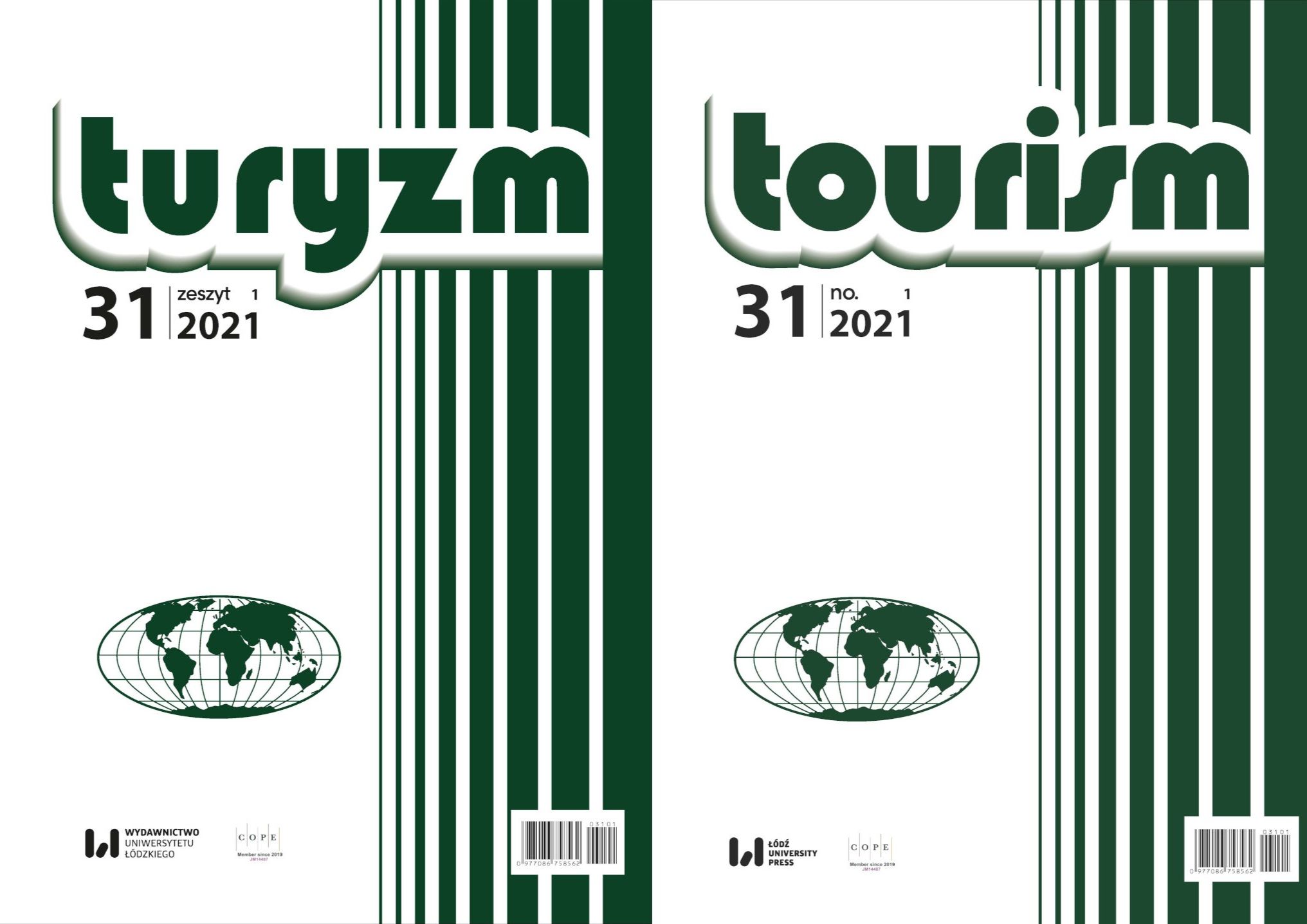TOWS analysis for sustainable ecotourism development and state support during the pandemic: The Aral Sea region of Uzbekistan
DOI:
https://doi.org/10.18778/0867-5856.31.1.16Keywords:
ecotourism, sustainable development, pandemic, Aral Sea region, Uzbekistan, exploratory studyAbstract
Evaluating the current ecotourism situation in the Aral Sea region of Uzbekistan and offering strategies for its sustainable development are the main objectives of the study. The threats, opportunities, weaknesses and strengths (TOWS) analysis was applied to identify the required management strategies. The article aims to review the literature on ecotourism promotion in the Aral Sea region. Based on TOWS, the results show that state support during the pandemic should be strategically coordinated to secure the sustainability of the ecotourism industry in Uzbekistan.
Downloads
References
Alimov, A. (2018). Main directions and prospects of development of ecological tourism in the Republic of Karakalpakstan. PhD thesis. Nukus, Uzbekistan: Karakalpak State University.
Google Scholar
Allanazarov, K., Alimov, A. (2019). The model of the development of ecotourism in special protected areas. Uzbekistan in the Central Asia Region. Geography, Geoeconomics, Geoecology. In Proceedings of the International Scientific and Practical Conference, Tashkent, Uzbekistan, 2, 34–39.
Google Scholar
Asadpourian, Z., Rahimian, M., Gholamrezai, S. (2020). SWOT-AHP-TOWS Analysis for sustainable ecotourism development in the best area in Lorestan Province, Iran. Social Indicators Research, 152 (1), 289–315. https://doi.org/10.1007/s11205-020-02438-0
Google Scholar
DOI: https://doi.org/10.1007/s11205-020-02438-0
Azam, M., Alam, M.M., Hafeez, M.H. (2018). Effect of tourism on environmental pollution: Further evidence from Malaysia, Singapore and Thailand. Journal of Cleaner Production, 190, 330–338. https://doi.org/10.1016/j.jclepro.2018.04.168
Google Scholar
DOI: https://doi.org/10.1016/j.jclepro.2018.04.168
Bekjanov, D. (2020). Assessment of the impact of COVID-19 pandemic on the tourism industry of Uzbekistan. Finance and Banking, 2, 225–237.
Google Scholar
Bekjanov, D., Matyusupov, B. (2020). Influence of innovative processes in the competitiveness of tourist destination. In: J.R. Rodrigues Soares (ed.), Innovation and entrepreneurial opportunities in community tourism (pp. 243–263). Madrid: IGI Global. https://doi.org/10.4018/978-1-7998-4855-4.ch014
Google Scholar
DOI: https://doi.org/10.4018/978-1-7998-4855-4.ch014
Berdiyorov, B. (2010). Ecotourism and place in the market of tourism services of Uzbekistan. PhD thesis. Samarkand, Uzbekistan.
Google Scholar
Ceballos-Lascurain, H. (1996). Tourism, ecotourism and protected areas. Gland, Switzerland: IUCN. The World Conservation Union. https://doi.org/10.2305/IUCN.CH.1996.7.en
Google Scholar
DOI: https://doi.org/10.2305/IUCN.CH.1996.7.en
Das, M., Chatterjee, B. (2015). Ecotourism: A panacea or a predicament? Tourism Management Perspectives, 14, 3–16. https://doi.org/10.1016/j.tmp.2015.01.002
Google Scholar
DOI: https://doi.org/10.1016/j.tmp.2015.01.002
Demir, S., Esbah, H., Akgun, A. (2016). Quantitative SWOT analysis for prioritizing ecotourism-planning decisions in protected areas: Igneada case. International Journal of Sustainable, Development & World Ecology, 23 (5), 456–468. https://doi.org/10.1080/13504509.2015.1136709
Google Scholar
DOI: https://doi.org/10.1080/13504509.2015.1136709
Dowling, R., Fennel, D. (2003). Ecotourism policy and planning: Stakeholders, management and governance. Ecotourism Policy Plan, 1, 331–344. https://doi.org/10.1079/9780851996097.0331
Google Scholar
DOI: https://doi.org/10.1079/9780851996097.0331
Higham, J. (2007). Critical issues in ecotourism: Understanding a complex tourism phenomenon. Oxford: Elsevier. https://doi.org/10.4324/9780080488608
Google Scholar
DOI: https://doi.org/10.4324/9780080488608
Holden, A. (2007). Environment and tourism. Routledge introductions to environment series. Bedfordshire: Routledge. https://doi.org/10.4324/9780203937624
Google Scholar
DOI: https://doi.org/10.4324/9780203937624
Hong, C.W., Chan, N.W. (2010). The Potentials, threats and challenges in sustainable development of Penang National Park. Malaysian Journal of Environmental Management, 11, 43–47.
Google Scholar
Hoshimov, M. (2009). Ecological tourism of Uzbekistan. Samarkand: „Zarafshon” publishing house.
Google Scholar
Jalani, J.O. (2012). Local people’s perception on the impacts and importance of ecotourism in Sabang, Palawan, Philippines. Procedia Social and Behavioral Sciences, 57 (9), 247–254. https://doi.org/10.1016/j.sbspro.2012.09.1182
Google Scholar
DOI: https://doi.org/10.1016/j.sbspro.2012.09.1182
Kamaletdinov, U. (2018). Opportunities for creating tourism clusters in the Aral Sea Basin. Business Daily, 1, 19–28.
Google Scholar
Khamidov, O. (2016). Improving management of ecological tourism development in Uzbekistan: Problems and solutions. Tashkent: Economics publishing house.
Google Scholar
Khamidov, O. (2017). Improvement of management mechanisms in the development of ecological tourism in Uzbekistan. PhD thesis. Tashkent: Tashkent State University of Economics.
Google Scholar
Khaytboyev, R. (2016). Ecological tourism – manual. Samarkand: Samarkand Institute of Economics and Service.
Google Scholar
Lenao, M., Basupi, B. (2016). Ecotourism development and female empowerment in Botswana: A review. Tourism Management Perspectives, 18, 51–58. https://doi.org/10.1016/j.tmp.2015.12.021
Google Scholar
DOI: https://doi.org/10.1016/j.tmp.2015.12.021
Lex.uz (2020a). Decree of the President of Uzbekistan on further development of tourism, no. 5611 from 5 January 2020. Retrieved from: https://lex.uz/docs/4562382 (2.07.2020).
Google Scholar
Lex.uz (2020b). Decree of the President of Uzbekistan on urgent measures to support tourism to reduce the negative impact of the coronavirus pandemic, no. 6002. Retrieved from: https://www.lex.uz/docs/-4831118 (28.05.2020).
Google Scholar
Lex.uz (2020c). Resolution of the President of Uzbekistan on additional measures to the development of the tourism sector in following the requirements of the strengthened sanitary-epidemiological security regime, no. 4755. Retrieved from: https://www.lex.uz/docs/-4862987 (19.06.2020).
Google Scholar
Liu., C., Li., J. (2013). Current trends of ecotourism in China’s nature reserves: a review of the Chinese literature. Tourism Management Perspectives, 7, 16–24. https://doi.org/10.1016/j.tmp.2013.03.001
Google Scholar
DOI: https://doi.org/10.1016/j.tmp.2013.03.001
Matyakubov, U. (2017). Perspective ecotourism development in Khorezm Region. Technology Innovation and Economics, 5, 3–5.
Google Scholar
Matyakubov, U., Defrancesco E. (2018). Role of agritourism in sustainable rural development in Uzbekistan: Insights from the Italian experience. International Journal of Economics, Commerce and Management, 3, 88–102.
Google Scholar
Matyakubov, U., Ibadullaev, E. (2020). Exploring the impact of the coronavirus pandemic on tourism and recreational services: Case from Republic of Uzbekistan. Science, Research, Development, 3, 168–171.
Google Scholar
Mayaka, M.A., Prasad, H. (2012). Tourism in Kenya: Analysis of strategic issues and challenges. Tourism Management Perspectives, 1, 48–56. https://doi.org/10.1016/j.tmp.2011.12.008
Google Scholar
DOI: https://doi.org/10.1016/j.tmp.2011.12.008
NOAA (2011). Assessment for sustainable tourism. Retrieved from: https://nmssanctuaries.blob.core.windows.net/sanctuaries-prod/media/archive/management/international/pdfs/day2_assessment_manual.pdf (22.05.2020).
Google Scholar
Rahemtulla, Y., Wellstead, A. (2001). Ecotourism: Understanding competing expert and academic definitions. Edmonton: Information Report.
Google Scholar
Rein H. (2005). Ecotourism as a market: Demands and success. Proceedings of the second international tourism, environment and culture symposium. 10–11 May 2005. Izmir: Ege Üniversitesi Yayınları.
Google Scholar
Rudenko, I., Lamers, J. (2010). The Aral Sea: An ecological disaster. Retrieved from: https://ecommons.cornell.edu/bitstream/handle/1813/55717/8-6.pdf?sequence=1 (1.11.2020).
Google Scholar
Saidmamatov, O., Matyakubov, U., Rudenko, I., Filimonau, V., Day, J., Luthe, T. (2020). Employing ecotourism opportunities for sustainability in the Aral Sea Region: Prospects and challenges. Sustainability, 12, 9249. https://doi.org/10.3390/su12219249
Google Scholar
DOI: https://doi.org/10.3390/su12219249
Saidmamatov, O., Rudenko, I., Baier, U., Khodjaniyazov, E. (2021). Challenges and solutions for biogas production from agriculture waste in the Aral Sea Basin. Processes, 9 (2), 199. https://doi.org/10.3390/pr9020199
Google Scholar
DOI: https://doi.org/10.3390/pr9020199
Saidmamatov, O., Rudenko, I., Pfister, S., Koziel, J. (2020). Water–energy–food nexus framework for promoting regional integration in Central Asia. Water, 12, 1896. https://doi.org/10.3390/w12071896
Google Scholar
DOI: https://doi.org/10.3390/w12071896
Salaev, S., Alimov, O. (2018). Development of tourism infrastructure of the Republic of Karakalpakstan. Journal of Economic Science, 2, 87–88.
Google Scholar
Salvatore, B., Marciano, C. (2019). Using a hybrid AHP-SWOT method to build participatory ecotourism development strategies: The case study of the Cupe Valley Natural Reserve in Southern Italy. In: L. Della Spina, F. Calabrò, C. Bevilacqua (eds), New Metropolitan Perspectives (pp. 327–336). Calabria, Italy: Springer. https://doi.org/10.1007/978-3-319-92102-0_35
Google Scholar
DOI: https://doi.org/10.1007/978-3-319-92102-0_35
SCRepUzEEP (2007). Concept of ecological tourism development in Uzbekistan. Tashkent: Ziyo.
Google Scholar
UNEP (2013). Green economy and trade – trends, challenges and opportunities. Retrieved from: http://www.unep.org/greeneconomy/GreenEconomyandTrade (11.11.2020)
Google Scholar
United Nations (2019). Sustainable tourism and sustainable development in Central Asia. UN, 4–8. https://doi.org/10.1017/s0020818300024334
Google Scholar
DOI: https://doi.org/10.1017/S0020818300024334
UNWTO (2019). International tourism highlights. World Tourism Organization. Retrieved from: https://www.e-unwto.org/doi/pdf/10.18111/9789284421152 (20.03.2020).
Google Scholar
UNWTO (2020). International tourism highlights international tourism continues to outpace the global economy. World Tourism Organisation. Retrieved from: https://www.unwto.org/international-tourism-growth-continues-to-outpace-the-economy (21.03.2020).
Google Scholar
Uzbek Tourism (2020). Analytical materials of Uzbek Tourism State Committed of Uzbekistan. Retrieved from: https://uzbektourism.uz/en/research (3.11.2020)
Google Scholar
UzDaily (2019). UN general assembly adopts a special resolution „Sustainable Tourism and Sustainable Development in Central Asia”. Retrieved from: https://uzdaily.uz/en/post/53803 (1.11.2020).
Google Scholar
Weaver, D., Oppermann, M. (2000). Tourism management. Brisbane: Wiley & Sons.
Google Scholar
Yagodin,, V.N., Betts A.V.G. (2009). The golden ring of Khorezm. Paris: UNESCO.
Google Scholar
Yılmaz, E. 2005. A land use planning model: A case study of Cehennemde Valley, Turkey. Retrieved from: https://www.researchgate.net/publication/339089107 (26.02.2021).
Google Scholar
Downloads
Published
How to Cite
Issue
Section
License

This work is licensed under a Creative Commons Attribution-NonCommercial-NoDerivatives 4.0 International License.










